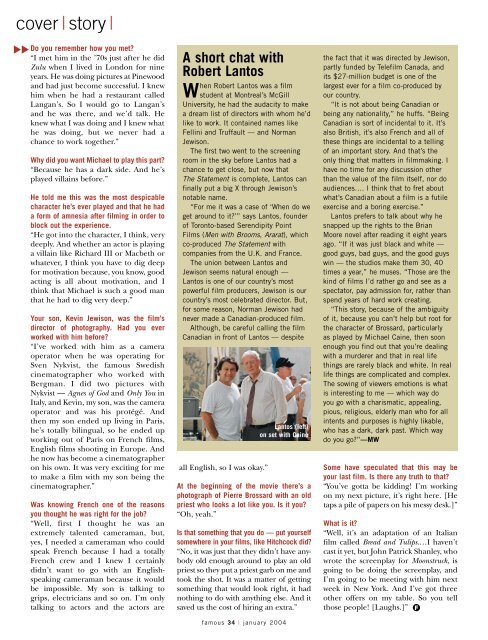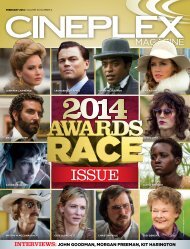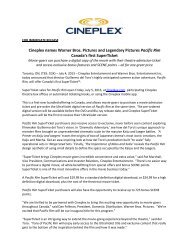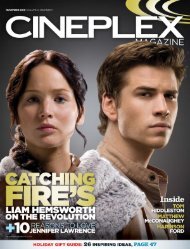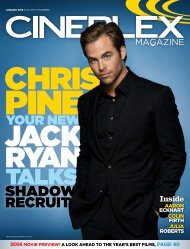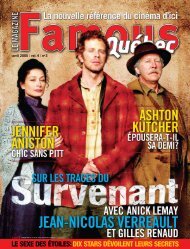THE STATEMENT
THE STATEMENT
THE STATEMENT
Create successful ePaper yourself
Turn your PDF publications into a flip-book with our unique Google optimized e-Paper software.
cover | story |<br />
� �<br />
Do you remember how you met?<br />
“I met him in the ’70s just after he did<br />
Zulu when I lived in London for nine<br />
years. He was doing pictures at Pinewood<br />
and had just become successful. I knew<br />
him when he had a restaurant called<br />
Langan’s. So I would go to Langan’s<br />
and he was there, and we’d talk. He<br />
knew what I was doing and I knew what<br />
he was doing, but we never had a<br />
chance to work together.”<br />
Why did you want Michael to play this part?<br />
“Because he has a dark side. And he’s<br />
played villains before.”<br />
He told me this was the most despicable<br />
character he’s ever played and that he had<br />
a form of amnesia after filming in order to<br />
block out the experience.<br />
“He got into the character, I think, very<br />
deeply. And whether an actor is playing<br />
a villain like Richard III or Macbeth or<br />
whatever, I think you have to dig deep<br />
for motivation because, you know, good<br />
acting is all about motivation, and I<br />
think that Michael is such a good man<br />
that he had to dig very deep.”<br />
Your son, Kevin Jewison, was the film’s<br />
director of photography. Had you ever<br />
worked with him before?<br />
“I’ve worked with him as a camera<br />
operator when he was operating for<br />
Sven Nykvist, the famous Swedish<br />
cinematographer who worked with<br />
Bergman. I did two pictures with<br />
Nykvist — Agnes of God and Only You in<br />
Italy, and Kevin, my son, was the camera<br />
operator and was his protégé. And<br />
then my son ended up living in Paris,<br />
he’s totally bilingual, so he ended up<br />
working out of Paris on French films,<br />
English films shooting in Europe. And<br />
he now has become a cinematographer<br />
on his own. It was very exciting for me<br />
to make a film with my son being the<br />
cinematographer.”<br />
Was knowing French one of the reasons<br />
you thought he was right for the job?<br />
“Well, first I thought he was an<br />
extremely talented cameraman, but,<br />
yes, I needed a cameraman who could<br />
speak French because I had a totally<br />
French crew and I knew I certainly<br />
didn’t want to go with an Englishspeaking<br />
cameraman because it would<br />
be impossible. My son is talking to<br />
grips, electricians and so on. I’m only<br />
talking to actors and the actors are<br />
A short chat with<br />
Robert Lantos<br />
When Robert Lantos was a film<br />
student at Montreal’s McGill<br />
University, he had the audacity to make<br />
a dream list of directors with whom he’d<br />
like to work. It contained names like<br />
Fellini and Truffault — and Norman<br />
Jewison.<br />
The first two went to the screening<br />
room in the sky before Lantos had a<br />
chance to get close, but now that<br />
The Statement is complete, Lantos can<br />
finally put a big X through Jewison’s<br />
notable name.<br />
“For me it was a case of ‘When do we<br />
get around to it?’” says Lantos, founder<br />
of Toronto-based Serendipity Point<br />
Films (Men with Brooms, Ararat), which<br />
co-produced The Statement with<br />
companies from the U.K. and France.<br />
The union between Lantos and<br />
Jewison seems natural enough —<br />
Lantos is one of our country’s most<br />
powerful film producers, Jewison is our<br />
country’s most celebrated director. But,<br />
for some reason, Norman Jewison had<br />
never made a Canadian-produced film.<br />
Although, be careful calling the film<br />
Canadian in front of Lantos — despite<br />
all English, so I was okay.”<br />
Lantos (left)<br />
on set with Caine<br />
At the beginning of the movie there’s a<br />
photograph of Pierre Brossard with an old<br />
priest who looks a lot like you. Is it you?<br />
“Oh, yeah.”<br />
Is that something that you do — put yourself<br />
somewhere in your films, like Hitchcock did?<br />
“No, it was just that they didn’t have anybody<br />
old enough around to play an old<br />
priest so they put a priest garb on me and<br />
took the shot. It was a matter of getting<br />
something that would look right, it had<br />
nothing to do with anything else. And it<br />
saved us the cost of hiring an extra.”<br />
famous 34 | january 2004<br />
the fact that it was directed by Jewison,<br />
partly funded by Telefilm Canada, and<br />
its $27-million budget is one of the<br />
largest ever for a film co-produced by<br />
our country.<br />
“It is not about being Canadian or<br />
being any nationality,” he huffs. “Being<br />
Canadian is sort of incidental to it. It’s<br />
also British, it’s also French and all of<br />
these things are incidental to a telling<br />
of an important story. And that’s the<br />
only thing that matters in filmmaking. I<br />
have no time for any discussion other<br />
than the value of the film itself, nor do<br />
audiences…. I think that to fret about<br />
what’s Canadian about a film is a futile<br />
exercise and a boring exercise.”<br />
Lantos prefers to talk about why he<br />
snapped up the rights to the Brian<br />
Moore novel after reading it eight years<br />
ago. “If it was just black and white —<br />
good guys, bad guys, and the good guys<br />
win — the studios make them 30, 40<br />
times a year,” he muses. “Those are the<br />
kind of films I’d rather go and see as a<br />
spectator, pay admission for, rather than<br />
spend years of hard work creating.<br />
“This story, because of the ambiguity<br />
of it, because you can’t help but root for<br />
the character of Brossard, particularly<br />
as played by Michael Caine, then soon<br />
enough you find out that you’re dealing<br />
with a murderer and that in real life<br />
things are rarely black and white. In real<br />
life things are complicated and complex.<br />
The sowing of viewers emotions is what<br />
is interesting to me — which way do<br />
you go with a charismatic, appealing,<br />
pious, religious, elderly man who for all<br />
intents and purposes is highly likable,<br />
who has a dark, dark past. Which way<br />
do you go?”—MW<br />
Some have speculated that this may be<br />
your last film. Is there any truth to that?<br />
“You’ve gotta be kidding! I’m working<br />
on my next picture, it’s right here. [He<br />
taps a pile of papers on his messy desk.]”<br />
What is it?<br />
“Well, it’s an adaptation of an Italian<br />
film called Bread and Tulips.…I haven’t<br />
cast it yet, but John Patrick Shanley, who<br />
wrote the screenplay for Moonstruck, is<br />
going to be doing the screenplay, and<br />
I’m going to be meeting with him next<br />
week in New York. And I’ve got three<br />
other offers on my table. So you tell<br />
those people! [Laughs.]”


